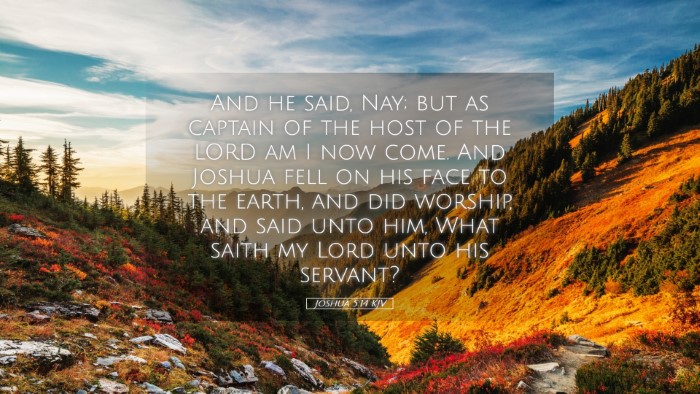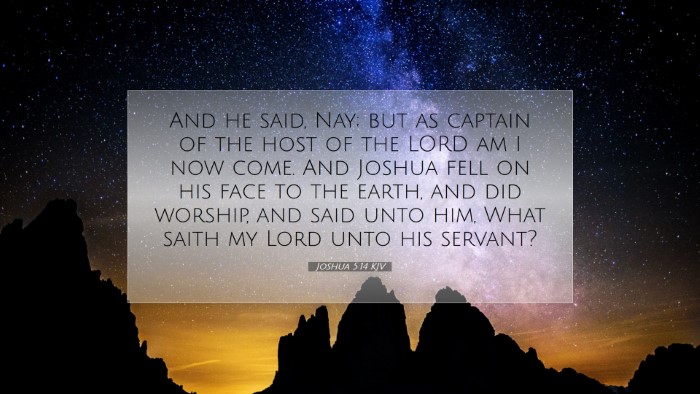Old Testament
Genesis Exodus Leviticus Numbers Deuteronomy Joshua Judges Ruth 1 Samuel 2 Samuel 1 Kings 2 Kings 1 Chronicles 2 Chronicles Ezra Nehemiah Esther Job Psalms Proverbs Ecclesiastes Song of Solomon Isaiah Jeremiah Lamentations Ezekiel Daniel Hosea Joel Amos Obadiah Jonah Micah Nahum Habakkuk Zephaniah Haggai Zechariah MalachiJoshua 5:14
Joshua 5:14 KJV
And he said, Nay; but as captain of the host of the LORD am I now come. And Joshua fell on his face to the earth, and did worship, and said unto him, What saith my Lord unto his servant?
Joshua 5:14 Bible Commentary
Commentary on Joshua 5:14
Verse Context: Joshua 5:14 states: “And he said, Nay; but as captain of the host of the Lord am I now come. And Joshua fell on his face to the earth, and did worship, and said unto him, What saith my lord unto his servant?” This passage reveals a pivotal moment in Joshua's leadership as he encounters a divine being, often interpreted as a theophany or Christ in pre-incarnate form.
Historical Context
Before analyzing the verse, it is essential to understand the setting surrounding Joshua. The Israelites had just crossed the Jordan River, entering the Promised Land after years of wandering in the desert. The atmosphere was charged with expectation, fear, and the need for divine guidance as they prepared to battle the fortified cities of Canaan.
Exegesis of the Verse
Joshua 5:14 presents a significant theological moment. The appearance of the commander of the Lord's army signifies God's active involvement in Israel's military endeavors. It reveals not only God's sovereignty but also His preparedness to fight alongside His people.
The Captain of the Host
- Divine Authority: The declaration of “the captain of the host of the Lord” illustrates divine authority and command over both the heavenly and earthly realms. Matthew Henry notes that this figure leads God's army, emphasizing that Israel's victories would be by divine strength, not human might.
- Pre-incarnate Christ: Many theologians, including Clarke, interpret this angelic figure as a representation of Christ. This encounter foreshadows Christ's ultimate leadership in spiritual battles during the New Testament era.
- Call to Worship: Joshua’s immediate response—prostrating himself in worship—exemplifies the proper reverence due to God’s messenger. It signifies an understanding of one's unworthiness before the divine presence, a theme also echoed in the experiences of Isaiah (Isaiah 6) and John (Revelation 1).
Joshua’s Cry for Guidance
The question, “What saith my lord unto his servant?” underscores Joshua's submission and desire for guidance. The role of the leader, especially during pivotal moments, includes seeking divine direction. This motif is essential for pastors and church leaders today, highlighting the need to seek God’s counsel in decision-making processes.
Theological Implications
This passage not only emphasizes God's sovereignty but also implies His readiness to engage with humanity. The following themes emerge:
- God’s Leadership: The idea of divine guidance through appointed leaders resonates throughout Scripture. Joshua’s experience serves as a model for spiritual leadership, establishing that leaders ought to rely on God’s commands instead of their own understanding (Proverbs 3:5-6).
- The Nature of Worship: Worship in this context transcends mere ritual; it is an acknowledgment of God's majesty and power. The act of falling prostrate before God signifies complete surrender and devotion.
- Military Metaphors: The imagery of the 'captain of the Lord's host' speaks to the spiritual warfare many believers face today. The New Testament expounds on this imagery further, reminding believers to put on the whole armor of God (Ephesians 6:10-18).
Application for Contemporary Believers
For pastors, students, and theologians, Joshua 5:14 serves several practical lessons:
- Seeking God’s Will: Just as Joshua sought guidance, believers must cultivate an ongoing relationship with God to discern His will in their lives and ministries.
- The Importance of Worship: In every aspect of ministry, worship must be at the forefront. Recognizing God’s lordship fosters an environment where faith can flourish.
- Understanding Spiritual Warfare: This passage reassures believers that they do not fight alone. Understanding the presence of Christ as their captain and commander offers empowerment to face spiritual challenges.
Conclusion
The encounter between Joshua and the captain of the Lord's hosts in Joshua 5:14 encapsulates themes of authority, worship, and divine guidance. In a world filled with uncertainties, this passage serves as a reminder that God leads His people into their divine destinies. As believers, the call to surrender to God's will and seek His guidance in all aspects remains foundational to a successful walk of faith.


